Leadership in Action: Scientific Management Principles and Asda Team
VerifiedAdded on 2020/02/05
|12
|2107
|34
Report
AI Summary
This report delves into the principles and practices of scientific management, analyzing its application within a chosen work team at Asda. The report begins with a summary of scientific management, emphasizing employee training and its impact on organizational productivity. It then examines Asda's team management practices through the lens of classical management theory, highlighting the importance of communication, delegation, and employee involvement in decision-making. The analysis extends to different management approaches, addressing criticisms of classical theory and suggesting methods for effective communication and team motivation, including monetary and non-monetary benefits. The report further explores the application of scientific management, its benefits, and relevance to contemporary organizations, particularly in enhancing teamwork and performance. Finally, it provides recommendations for improving team work design, emphasizing employee training, performance reviews, and the adoption of diverse leadership styles to resolve work delegation issues and improve organizational performance.

LEADERSHIP IN ACTION
1
1
Paraphrase This Document
Need a fresh take? Get an instant paraphrase of this document with our AI Paraphraser
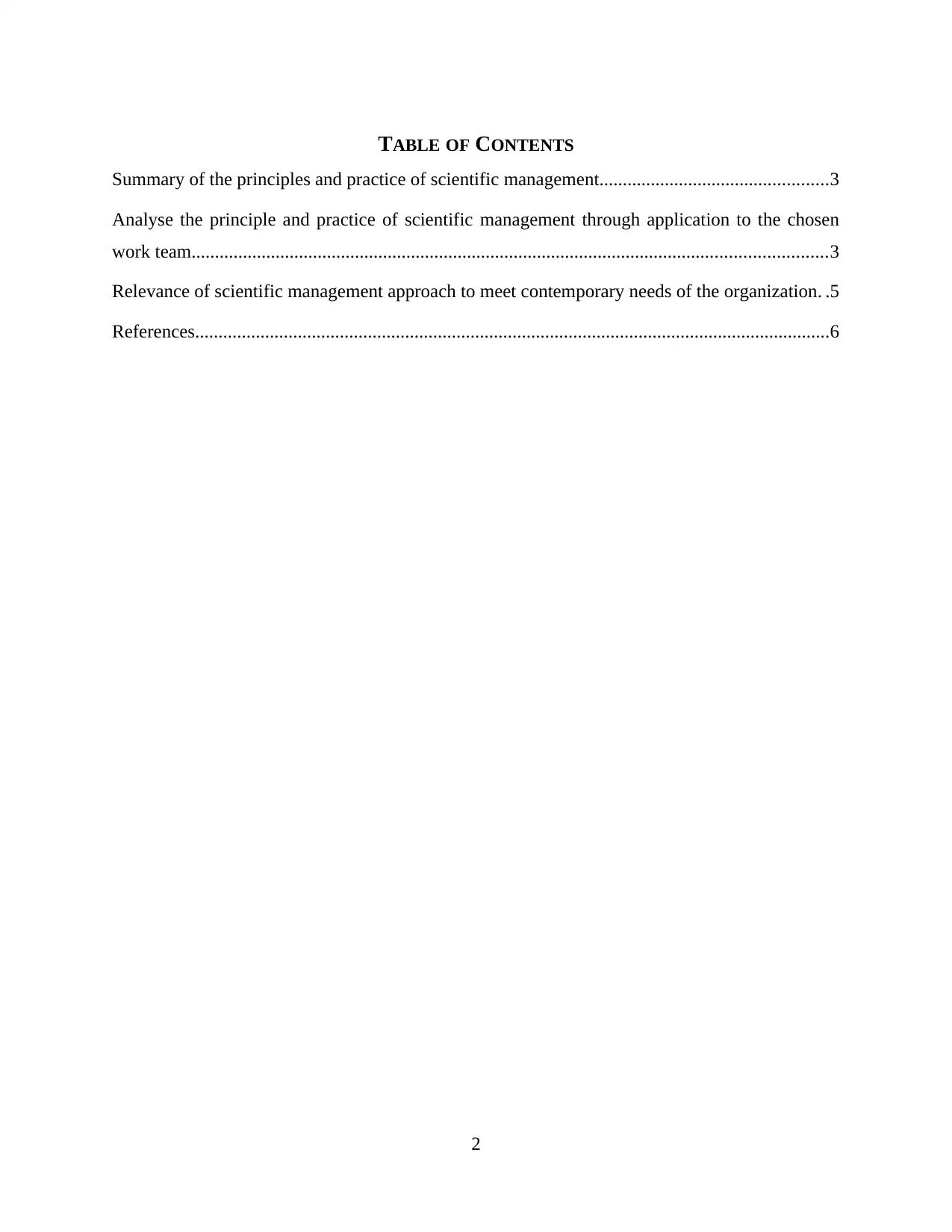
TABLE OF CONTENTS
Summary of the principles and practice of scientific management.................................................3
Analyse the principle and practice of scientific management through application to the chosen
work team........................................................................................................................................3
Relevance of scientific management approach to meet contemporary needs of the organization. .5
References........................................................................................................................................6
2
Summary of the principles and practice of scientific management.................................................3
Analyse the principle and practice of scientific management through application to the chosen
work team........................................................................................................................................3
Relevance of scientific management approach to meet contemporary needs of the organization. .5
References........................................................................................................................................6
2
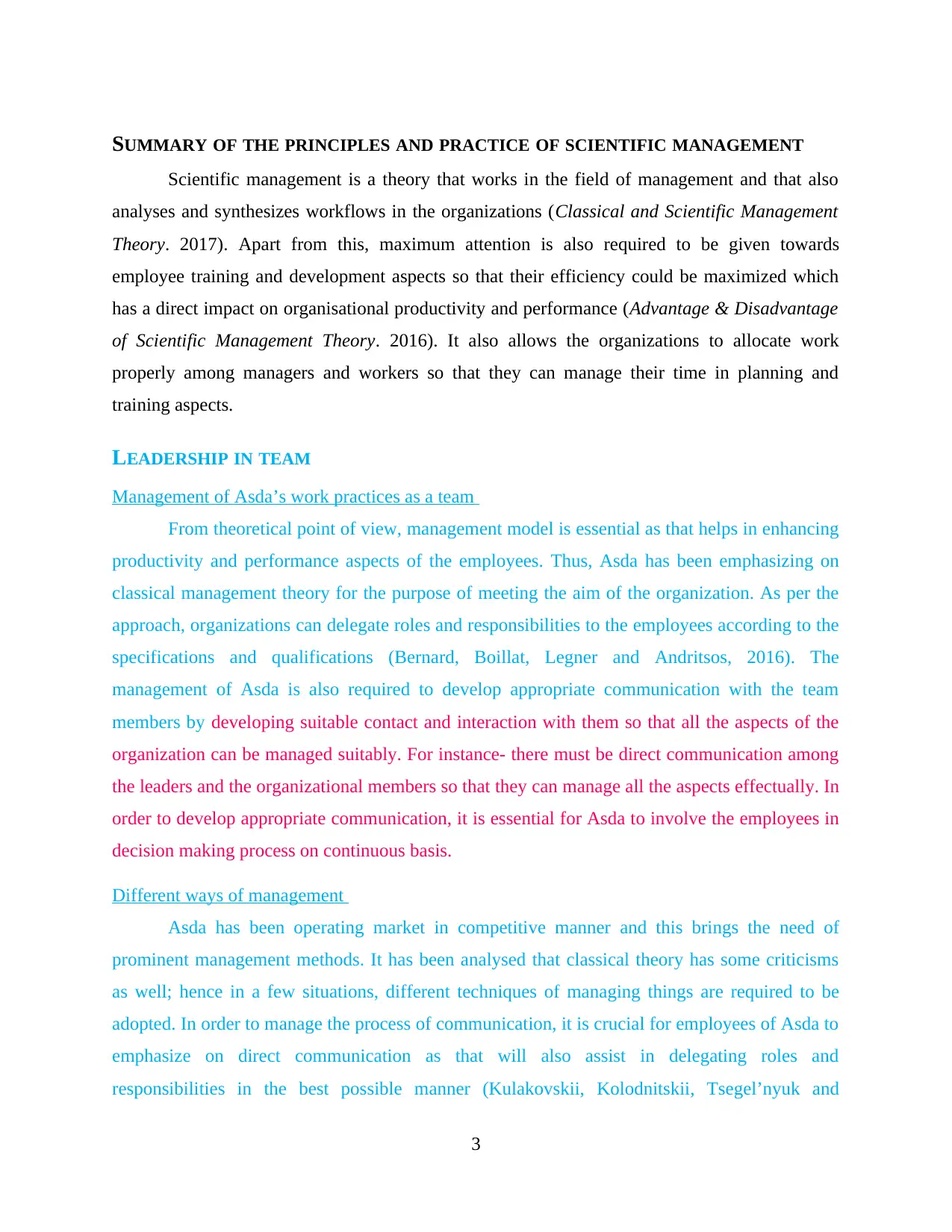
SUMMARY OF THE PRINCIPLES AND PRACTICE OF SCIENTIFIC MANAGEMENT
Scientific management is a theory that works in the field of management and that also
analyses and synthesizes workflows in the organizations (Classical and Scientific Management
Theory. 2017). Apart from this, maximum attention is also required to be given towards
employee training and development aspects so that their efficiency could be maximized which
has a direct impact on organisational productivity and performance (Advantage & Disadvantage
of Scientific Management Theory. 2016). It also allows the organizations to allocate work
properly among managers and workers so that they can manage their time in planning and
training aspects.
LEADERSHIP IN TEAM
Management of Asda’s work practices as a team
From theoretical point of view, management model is essential as that helps in enhancing
productivity and performance aspects of the employees. Thus, Asda has been emphasizing on
classical management theory for the purpose of meeting the aim of the organization. As per the
approach, organizations can delegate roles and responsibilities to the employees according to the
specifications and qualifications (Bernard, Boillat, Legner and Andritsos, 2016). The
management of Asda is also required to develop appropriate communication with the team
members by developing suitable contact and interaction with them so that all the aspects of the
organization can be managed suitably. For instance- there must be direct communication among
the leaders and the organizational members so that they can manage all the aspects effectually. In
order to develop appropriate communication, it is essential for Asda to involve the employees in
decision making process on continuous basis.
Different ways of management
Asda has been operating market in competitive manner and this brings the need of
prominent management methods. It has been analysed that classical theory has some criticisms
as well; hence in a few situations, different techniques of managing things are required to be
adopted. In order to manage the process of communication, it is crucial for employees of Asda to
emphasize on direct communication as that will also assist in delegating roles and
responsibilities in the best possible manner (Kulakovskii, Kolodnitskii, Tsegel’nyuk and
3
Scientific management is a theory that works in the field of management and that also
analyses and synthesizes workflows in the organizations (Classical and Scientific Management
Theory. 2017). Apart from this, maximum attention is also required to be given towards
employee training and development aspects so that their efficiency could be maximized which
has a direct impact on organisational productivity and performance (Advantage & Disadvantage
of Scientific Management Theory. 2016). It also allows the organizations to allocate work
properly among managers and workers so that they can manage their time in planning and
training aspects.
LEADERSHIP IN TEAM
Management of Asda’s work practices as a team
From theoretical point of view, management model is essential as that helps in enhancing
productivity and performance aspects of the employees. Thus, Asda has been emphasizing on
classical management theory for the purpose of meeting the aim of the organization. As per the
approach, organizations can delegate roles and responsibilities to the employees according to the
specifications and qualifications (Bernard, Boillat, Legner and Andritsos, 2016). The
management of Asda is also required to develop appropriate communication with the team
members by developing suitable contact and interaction with them so that all the aspects of the
organization can be managed suitably. For instance- there must be direct communication among
the leaders and the organizational members so that they can manage all the aspects effectually. In
order to develop appropriate communication, it is essential for Asda to involve the employees in
decision making process on continuous basis.
Different ways of management
Asda has been operating market in competitive manner and this brings the need of
prominent management methods. It has been analysed that classical theory has some criticisms
as well; hence in a few situations, different techniques of managing things are required to be
adopted. In order to manage the process of communication, it is crucial for employees of Asda to
emphasize on direct communication as that will also assist in delegating roles and
responsibilities in the best possible manner (Kulakovskii, Kolodnitskii, Tsegel’nyuk and
3
⊘ This is a preview!⊘
Do you want full access?
Subscribe today to unlock all pages.

Trusted by 1+ million students worldwide
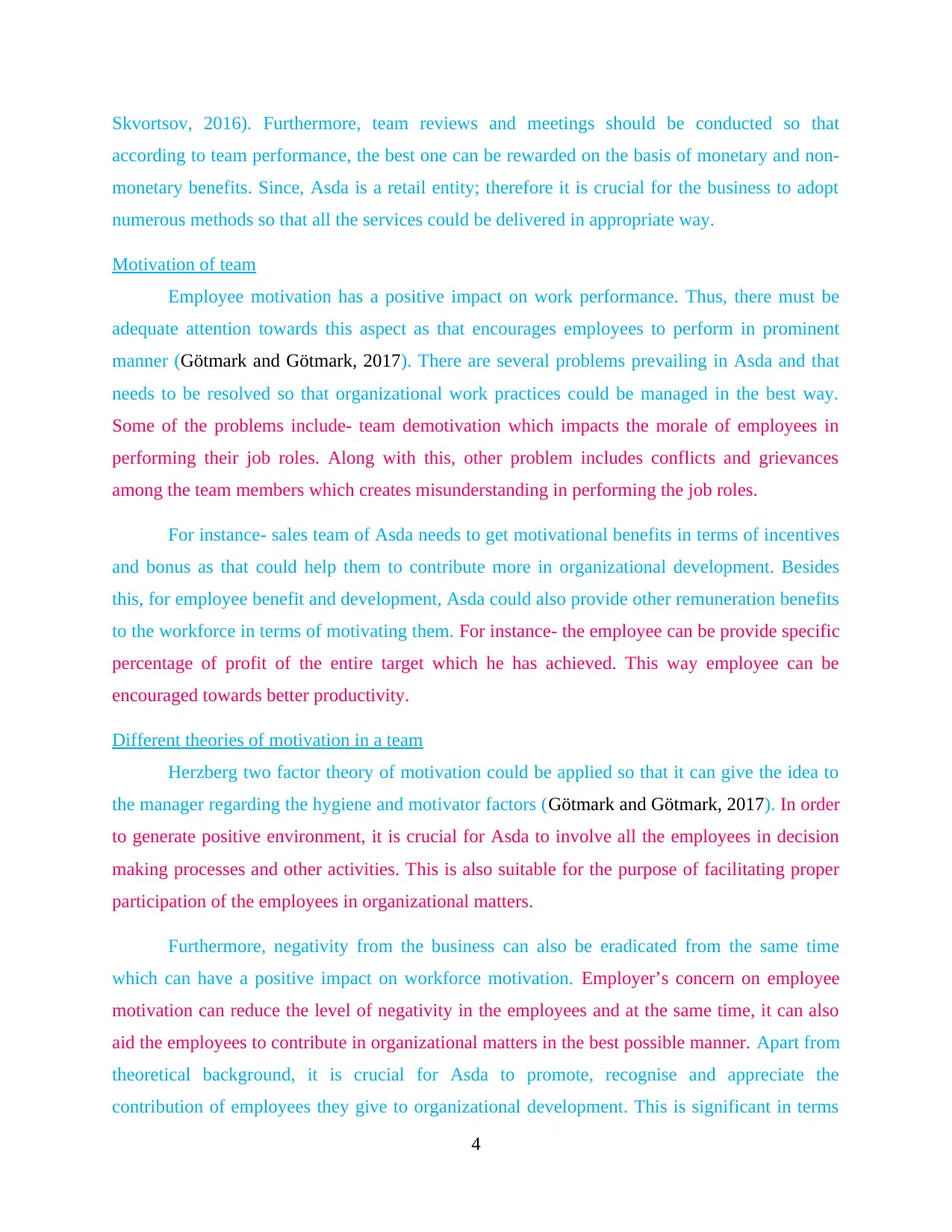
Skvortsov, 2016). Furthermore, team reviews and meetings should be conducted so that
according to team performance, the best one can be rewarded on the basis of monetary and non-
monetary benefits. Since, Asda is a retail entity; therefore it is crucial for the business to adopt
numerous methods so that all the services could be delivered in appropriate way.
Motivation of team
Employee motivation has a positive impact on work performance. Thus, there must be
adequate attention towards this aspect as that encourages employees to perform in prominent
manner (Götmark and Götmark, 2017). There are several problems prevailing in Asda and that
needs to be resolved so that organizational work practices could be managed in the best way.
Some of the problems include- team demotivation which impacts the morale of employees in
performing their job roles. Along with this, other problem includes conflicts and grievances
among the team members which creates misunderstanding in performing the job roles.
For instance- sales team of Asda needs to get motivational benefits in terms of incentives
and bonus as that could help them to contribute more in organizational development. Besides
this, for employee benefit and development, Asda could also provide other remuneration benefits
to the workforce in terms of motivating them. For instance- the employee can be provide specific
percentage of profit of the entire target which he has achieved. This way employee can be
encouraged towards better productivity.
Different theories of motivation in a team
Herzberg two factor theory of motivation could be applied so that it can give the idea to
the manager regarding the hygiene and motivator factors (Götmark and Götmark, 2017). In order
to generate positive environment, it is crucial for Asda to involve all the employees in decision
making processes and other activities. This is also suitable for the purpose of facilitating proper
participation of the employees in organizational matters.
Furthermore, negativity from the business can also be eradicated from the same time
which can have a positive impact on workforce motivation. Employer’s concern on employee
motivation can reduce the level of negativity in the employees and at the same time, it can also
aid the employees to contribute in organizational matters in the best possible manner. Apart from
theoretical background, it is crucial for Asda to promote, recognise and appreciate the
contribution of employees they give to organizational development. This is significant in terms
4
according to team performance, the best one can be rewarded on the basis of monetary and non-
monetary benefits. Since, Asda is a retail entity; therefore it is crucial for the business to adopt
numerous methods so that all the services could be delivered in appropriate way.
Motivation of team
Employee motivation has a positive impact on work performance. Thus, there must be
adequate attention towards this aspect as that encourages employees to perform in prominent
manner (Götmark and Götmark, 2017). There are several problems prevailing in Asda and that
needs to be resolved so that organizational work practices could be managed in the best way.
Some of the problems include- team demotivation which impacts the morale of employees in
performing their job roles. Along with this, other problem includes conflicts and grievances
among the team members which creates misunderstanding in performing the job roles.
For instance- sales team of Asda needs to get motivational benefits in terms of incentives
and bonus as that could help them to contribute more in organizational development. Besides
this, for employee benefit and development, Asda could also provide other remuneration benefits
to the workforce in terms of motivating them. For instance- the employee can be provide specific
percentage of profit of the entire target which he has achieved. This way employee can be
encouraged towards better productivity.
Different theories of motivation in a team
Herzberg two factor theory of motivation could be applied so that it can give the idea to
the manager regarding the hygiene and motivator factors (Götmark and Götmark, 2017). In order
to generate positive environment, it is crucial for Asda to involve all the employees in decision
making processes and other activities. This is also suitable for the purpose of facilitating proper
participation of the employees in organizational matters.
Furthermore, negativity from the business can also be eradicated from the same time
which can have a positive impact on workforce motivation. Employer’s concern on employee
motivation can reduce the level of negativity in the employees and at the same time, it can also
aid the employees to contribute in organizational matters in the best possible manner. Apart from
theoretical background, it is crucial for Asda to promote, recognise and appreciate the
contribution of employees they give to organizational development. This is significant in terms
4
Paraphrase This Document
Need a fresh take? Get an instant paraphrase of this document with our AI Paraphraser
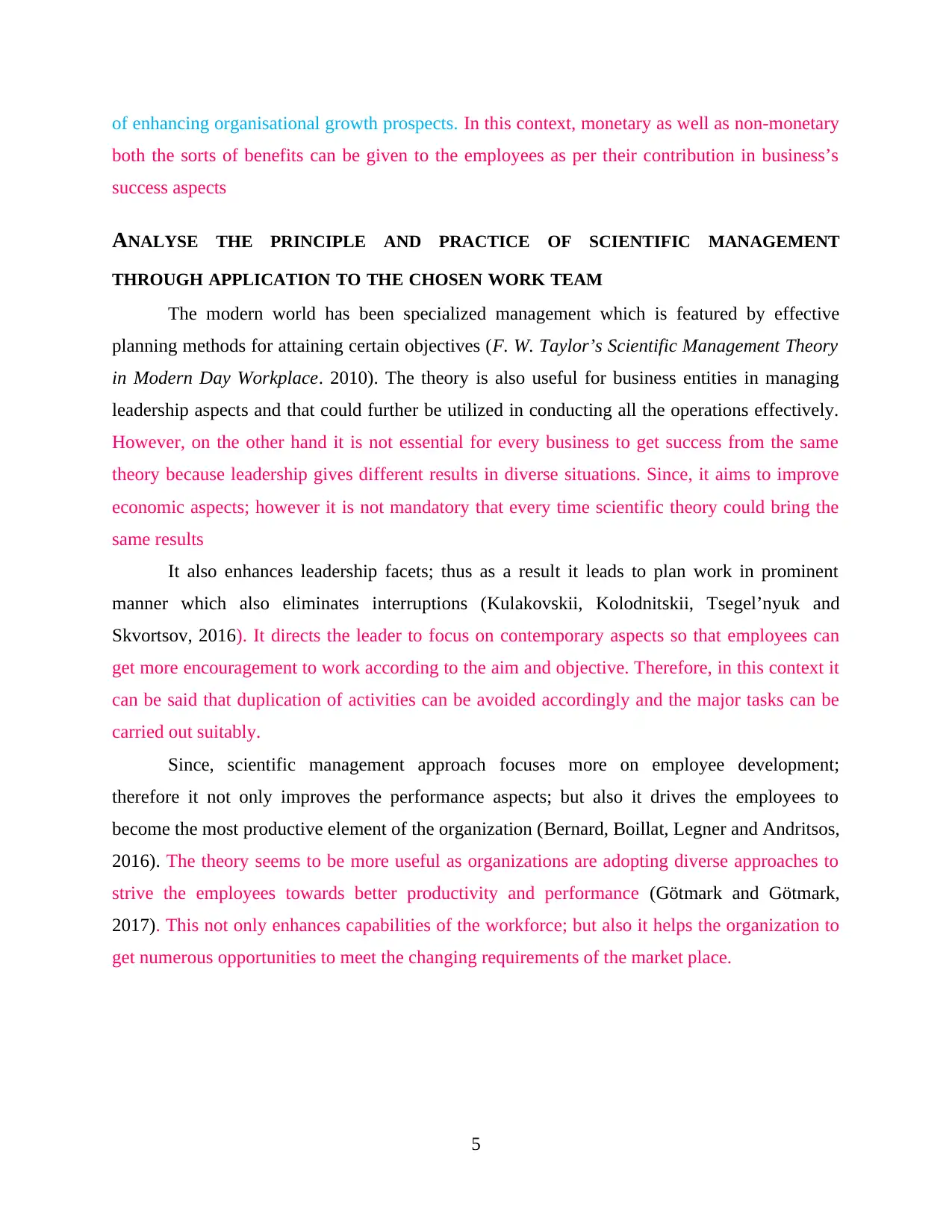
of enhancing organisational growth prospects. In this context, monetary as well as non-monetary
both the sorts of benefits can be given to the employees as per their contribution in business’s
success aspects
ANALYSE THE PRINCIPLE AND PRACTICE OF SCIENTIFIC MANAGEMENT
THROUGH APPLICATION TO THE CHOSEN WORK TEAM
The modern world has been specialized management which is featured by effective
planning methods for attaining certain objectives (F. W. Taylor’s Scientific Management Theory
in Modern Day Workplace. 2010). The theory is also useful for business entities in managing
leadership aspects and that could further be utilized in conducting all the operations effectively.
However, on the other hand it is not essential for every business to get success from the same
theory because leadership gives different results in diverse situations. Since, it aims to improve
economic aspects; however it is not mandatory that every time scientific theory could bring the
same results
It also enhances leadership facets; thus as a result it leads to plan work in prominent
manner which also eliminates interruptions (Kulakovskii, Kolodnitskii, Tsegel’nyuk and
Skvortsov, 2016). It directs the leader to focus on contemporary aspects so that employees can
get more encouragement to work according to the aim and objective. Therefore, in this context it
can be said that duplication of activities can be avoided accordingly and the major tasks can be
carried out suitably.
Since, scientific management approach focuses more on employee development;
therefore it not only improves the performance aspects; but also it drives the employees to
become the most productive element of the organization (Bernard, Boillat, Legner and Andritsos,
2016). The theory seems to be more useful as organizations are adopting diverse approaches to
strive the employees towards better productivity and performance (Götmark and Götmark,
2017). This not only enhances capabilities of the workforce; but also it helps the organization to
get numerous opportunities to meet the changing requirements of the market place.
5
both the sorts of benefits can be given to the employees as per their contribution in business’s
success aspects
ANALYSE THE PRINCIPLE AND PRACTICE OF SCIENTIFIC MANAGEMENT
THROUGH APPLICATION TO THE CHOSEN WORK TEAM
The modern world has been specialized management which is featured by effective
planning methods for attaining certain objectives (F. W. Taylor’s Scientific Management Theory
in Modern Day Workplace. 2010). The theory is also useful for business entities in managing
leadership aspects and that could further be utilized in conducting all the operations effectively.
However, on the other hand it is not essential for every business to get success from the same
theory because leadership gives different results in diverse situations. Since, it aims to improve
economic aspects; however it is not mandatory that every time scientific theory could bring the
same results
It also enhances leadership facets; thus as a result it leads to plan work in prominent
manner which also eliminates interruptions (Kulakovskii, Kolodnitskii, Tsegel’nyuk and
Skvortsov, 2016). It directs the leader to focus on contemporary aspects so that employees can
get more encouragement to work according to the aim and objective. Therefore, in this context it
can be said that duplication of activities can be avoided accordingly and the major tasks can be
carried out suitably.
Since, scientific management approach focuses more on employee development;
therefore it not only improves the performance aspects; but also it drives the employees to
become the most productive element of the organization (Bernard, Boillat, Legner and Andritsos,
2016). The theory seems to be more useful as organizations are adopting diverse approaches to
strive the employees towards better productivity and performance (Götmark and Götmark,
2017). This not only enhances capabilities of the workforce; but also it helps the organization to
get numerous opportunities to meet the changing requirements of the market place.
5
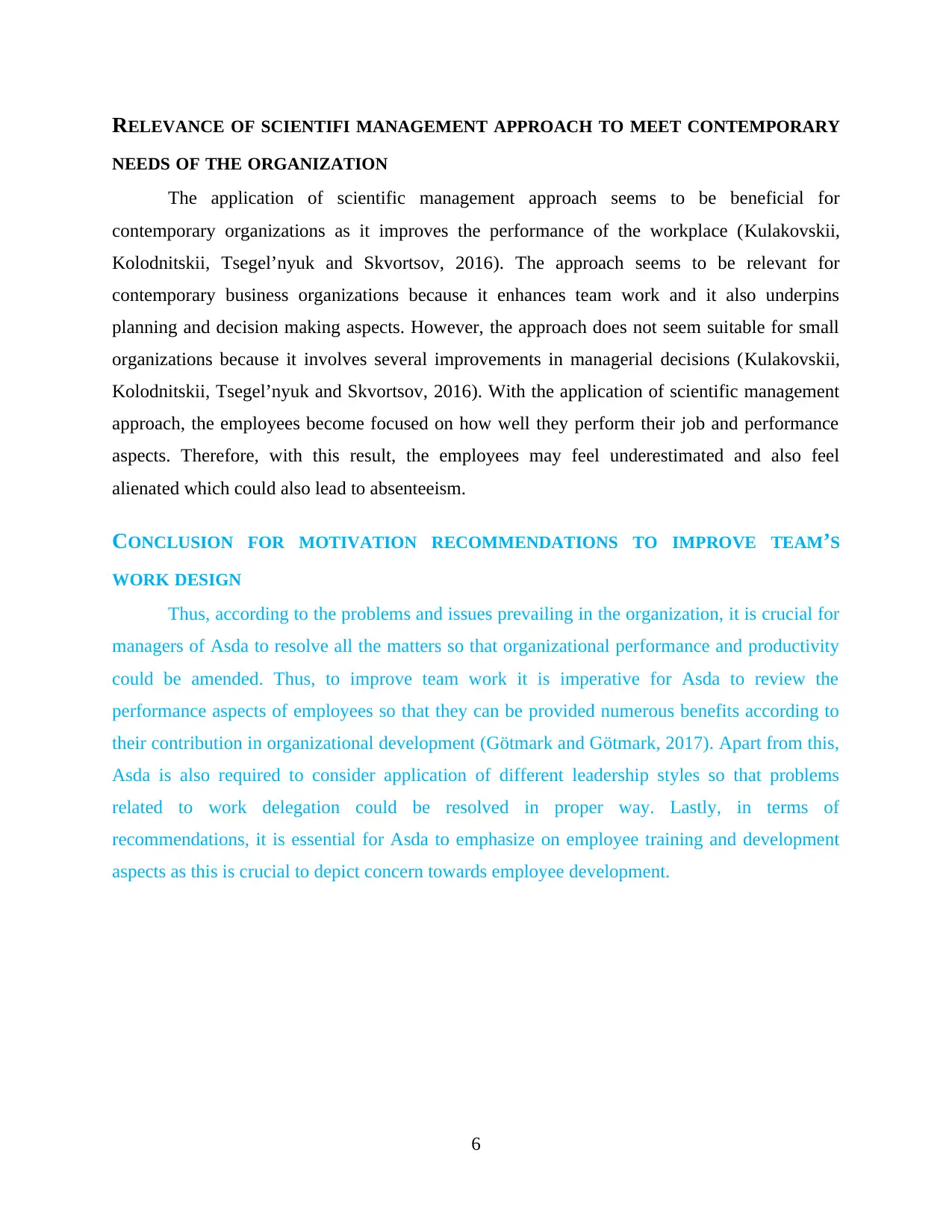
RELEVANCE OF SCIENTIFI MANAGEMENT APPROACH TO MEET CONTEMPORARY
NEEDS OF THE ORGANIZATION
The application of scientific management approach seems to be beneficial for
contemporary organizations as it improves the performance of the workplace (Kulakovskii,
Kolodnitskii, Tsegel’nyuk and Skvortsov, 2016). The approach seems to be relevant for
contemporary business organizations because it enhances team work and it also underpins
planning and decision making aspects. However, the approach does not seem suitable for small
organizations because it involves several improvements in managerial decisions (Kulakovskii,
Kolodnitskii, Tsegel’nyuk and Skvortsov, 2016). With the application of scientific management
approach, the employees become focused on how well they perform their job and performance
aspects. Therefore, with this result, the employees may feel underestimated and also feel
alienated which could also lead to absenteeism.
CONCLUSION FOR MOTIVATION RECOMMENDATIONS TO IMPROVE TEAM’S
WORK DESIGN
Thus, according to the problems and issues prevailing in the organization, it is crucial for
managers of Asda to resolve all the matters so that organizational performance and productivity
could be amended. Thus, to improve team work it is imperative for Asda to review the
performance aspects of employees so that they can be provided numerous benefits according to
their contribution in organizational development (Götmark and Götmark, 2017). Apart from this,
Asda is also required to consider application of different leadership styles so that problems
related to work delegation could be resolved in proper way. Lastly, in terms of
recommendations, it is essential for Asda to emphasize on employee training and development
aspects as this is crucial to depict concern towards employee development.
6
NEEDS OF THE ORGANIZATION
The application of scientific management approach seems to be beneficial for
contemporary organizations as it improves the performance of the workplace (Kulakovskii,
Kolodnitskii, Tsegel’nyuk and Skvortsov, 2016). The approach seems to be relevant for
contemporary business organizations because it enhances team work and it also underpins
planning and decision making aspects. However, the approach does not seem suitable for small
organizations because it involves several improvements in managerial decisions (Kulakovskii,
Kolodnitskii, Tsegel’nyuk and Skvortsov, 2016). With the application of scientific management
approach, the employees become focused on how well they perform their job and performance
aspects. Therefore, with this result, the employees may feel underestimated and also feel
alienated which could also lead to absenteeism.
CONCLUSION FOR MOTIVATION RECOMMENDATIONS TO IMPROVE TEAM’S
WORK DESIGN
Thus, according to the problems and issues prevailing in the organization, it is crucial for
managers of Asda to resolve all the matters so that organizational performance and productivity
could be amended. Thus, to improve team work it is imperative for Asda to review the
performance aspects of employees so that they can be provided numerous benefits according to
their contribution in organizational development (Götmark and Götmark, 2017). Apart from this,
Asda is also required to consider application of different leadership styles so that problems
related to work delegation could be resolved in proper way. Lastly, in terms of
recommendations, it is essential for Asda to emphasize on employee training and development
aspects as this is crucial to depict concern towards employee development.
6
⊘ This is a preview!⊘
Do you want full access?
Subscribe today to unlock all pages.

Trusted by 1+ million students worldwide
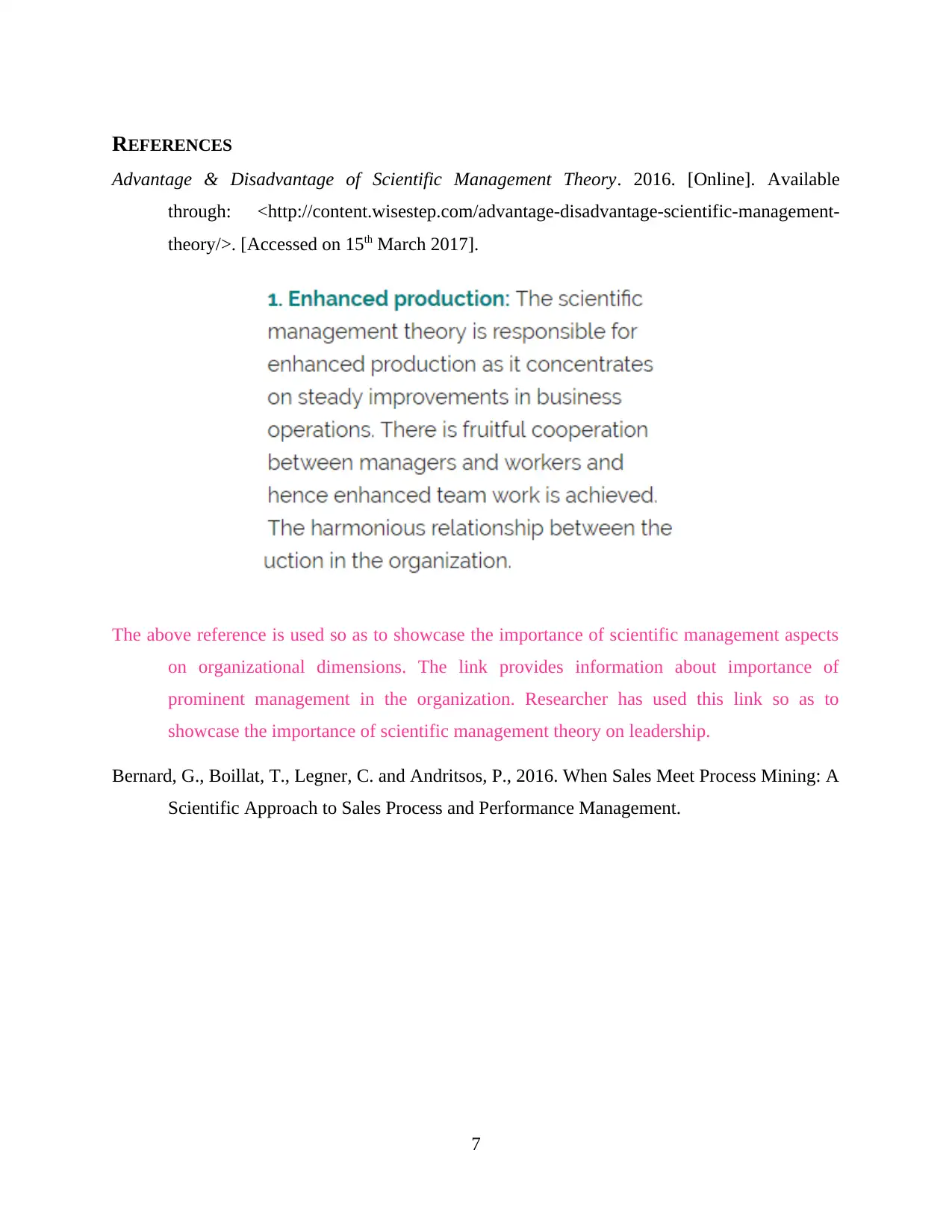
REFERENCES
Advantage & Disadvantage of Scientific Management Theory. 2016. [Online]. Available
through: <http://content.wisestep.com/advantage-disadvantage-scientific-management-
theory/>. [Accessed on 15th March 2017].
The above reference is used so as to showcase the importance of scientific management aspects
on organizational dimensions. The link provides information about importance of
prominent management in the organization. Researcher has used this link so as to
showcase the importance of scientific management theory on leadership.
Bernard, G., Boillat, T., Legner, C. and Andritsos, P., 2016. When Sales Meet Process Mining: A
Scientific Approach to Sales Process and Performance Management.
7
Advantage & Disadvantage of Scientific Management Theory. 2016. [Online]. Available
through: <http://content.wisestep.com/advantage-disadvantage-scientific-management-
theory/>. [Accessed on 15th March 2017].
The above reference is used so as to showcase the importance of scientific management aspects
on organizational dimensions. The link provides information about importance of
prominent management in the organization. Researcher has used this link so as to
showcase the importance of scientific management theory on leadership.
Bernard, G., Boillat, T., Legner, C. and Andritsos, P., 2016. When Sales Meet Process Mining: A
Scientific Approach to Sales Process and Performance Management.
7
Paraphrase This Document
Need a fresh take? Get an instant paraphrase of this document with our AI Paraphraser
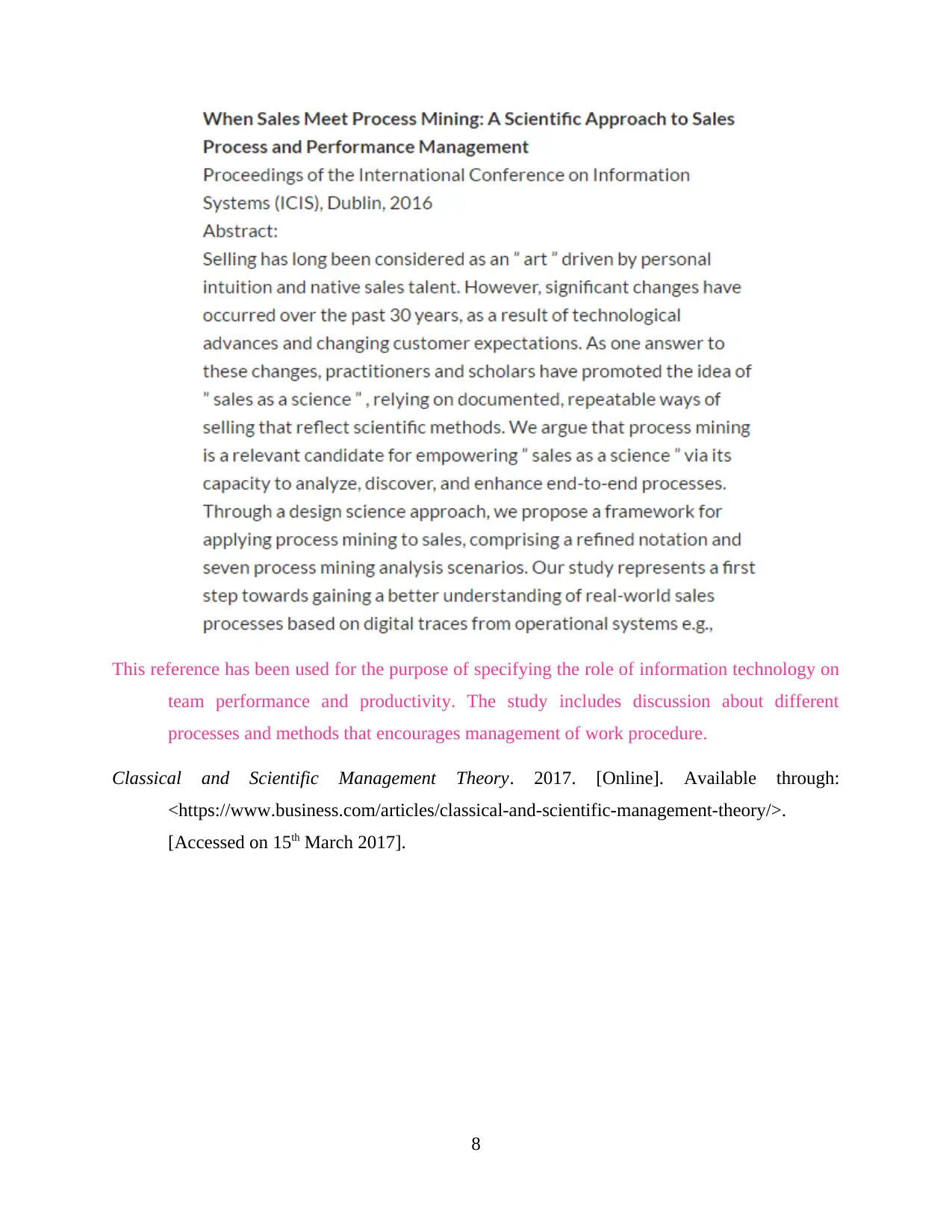
This reference has been used for the purpose of specifying the role of information technology on
team performance and productivity. The study includes discussion about different
processes and methods that encourages management of work procedure.
Classical and Scientific Management Theory. 2017. [Online]. Available through:
<https://www.business.com/articles/classical-and-scientific-management-theory/>.
[Accessed on 15th March 2017].
8
team performance and productivity. The study includes discussion about different
processes and methods that encourages management of work procedure.
Classical and Scientific Management Theory. 2017. [Online]. Available through:
<https://www.business.com/articles/classical-and-scientific-management-theory/>.
[Accessed on 15th March 2017].
8
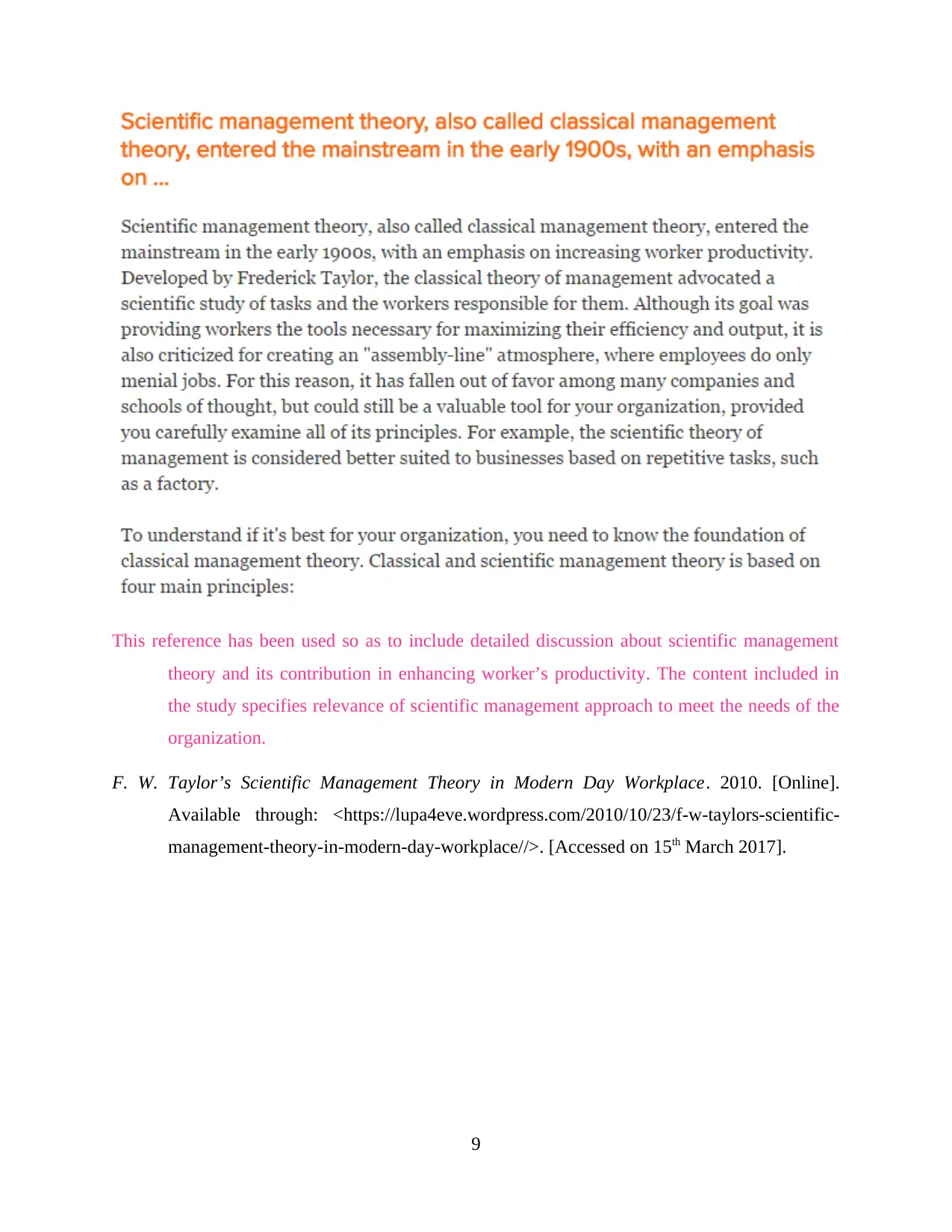
This reference has been used so as to include detailed discussion about scientific management
theory and its contribution in enhancing worker’s productivity. The content included in
the study specifies relevance of scientific management approach to meet the needs of the
organization.
F. W. Taylor’s Scientific Management Theory in Modern Day Workplace. 2010. [Online].
Available through: <https://lupa4eve.wordpress.com/2010/10/23/f-w-taylors-scientific-
management-theory-in-modern-day-workplace//>. [Accessed on 15th March 2017].
9
theory and its contribution in enhancing worker’s productivity. The content included in
the study specifies relevance of scientific management approach to meet the needs of the
organization.
F. W. Taylor’s Scientific Management Theory in Modern Day Workplace. 2010. [Online].
Available through: <https://lupa4eve.wordpress.com/2010/10/23/f-w-taylors-scientific-
management-theory-in-modern-day-workplace//>. [Accessed on 15th March 2017].
9
⊘ This is a preview!⊘
Do you want full access?
Subscribe today to unlock all pages.

Trusted by 1+ million students worldwide
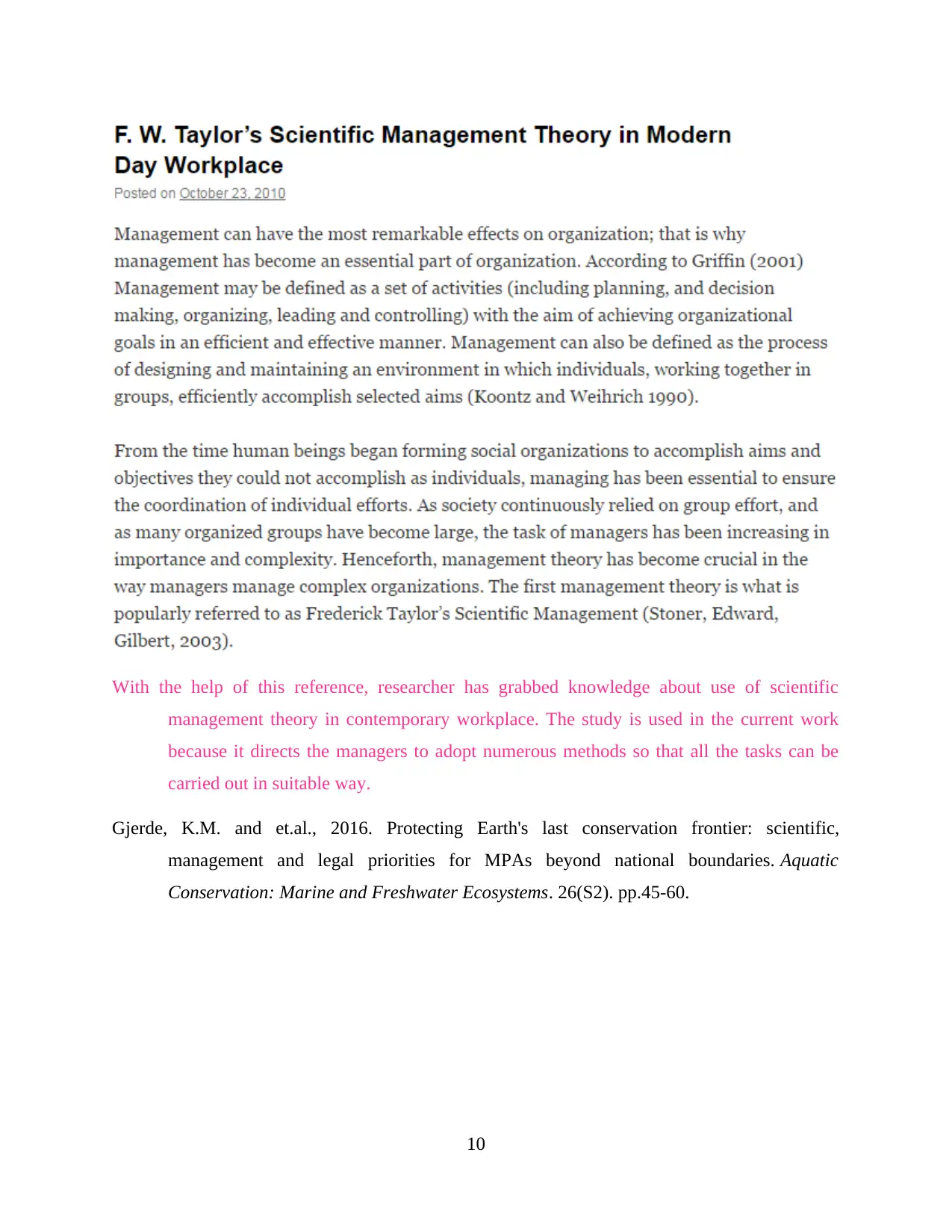
With the help of this reference, researcher has grabbed knowledge about use of scientific
management theory in contemporary workplace. The study is used in the current work
because it directs the managers to adopt numerous methods so that all the tasks can be
carried out in suitable way.
Gjerde, K.M. and et.al., 2016. Protecting Earth's last conservation frontier: scientific,
management and legal priorities for MPAs beyond national boundaries. Aquatic
Conservation: Marine and Freshwater Ecosystems. 26(S2). pp.45-60.
10
management theory in contemporary workplace. The study is used in the current work
because it directs the managers to adopt numerous methods so that all the tasks can be
carried out in suitable way.
Gjerde, K.M. and et.al., 2016. Protecting Earth's last conservation frontier: scientific,
management and legal priorities for MPAs beyond national boundaries. Aquatic
Conservation: Marine and Freshwater Ecosystems. 26(S2). pp.45-60.
10
Paraphrase This Document
Need a fresh take? Get an instant paraphrase of this document with our AI Paraphraser
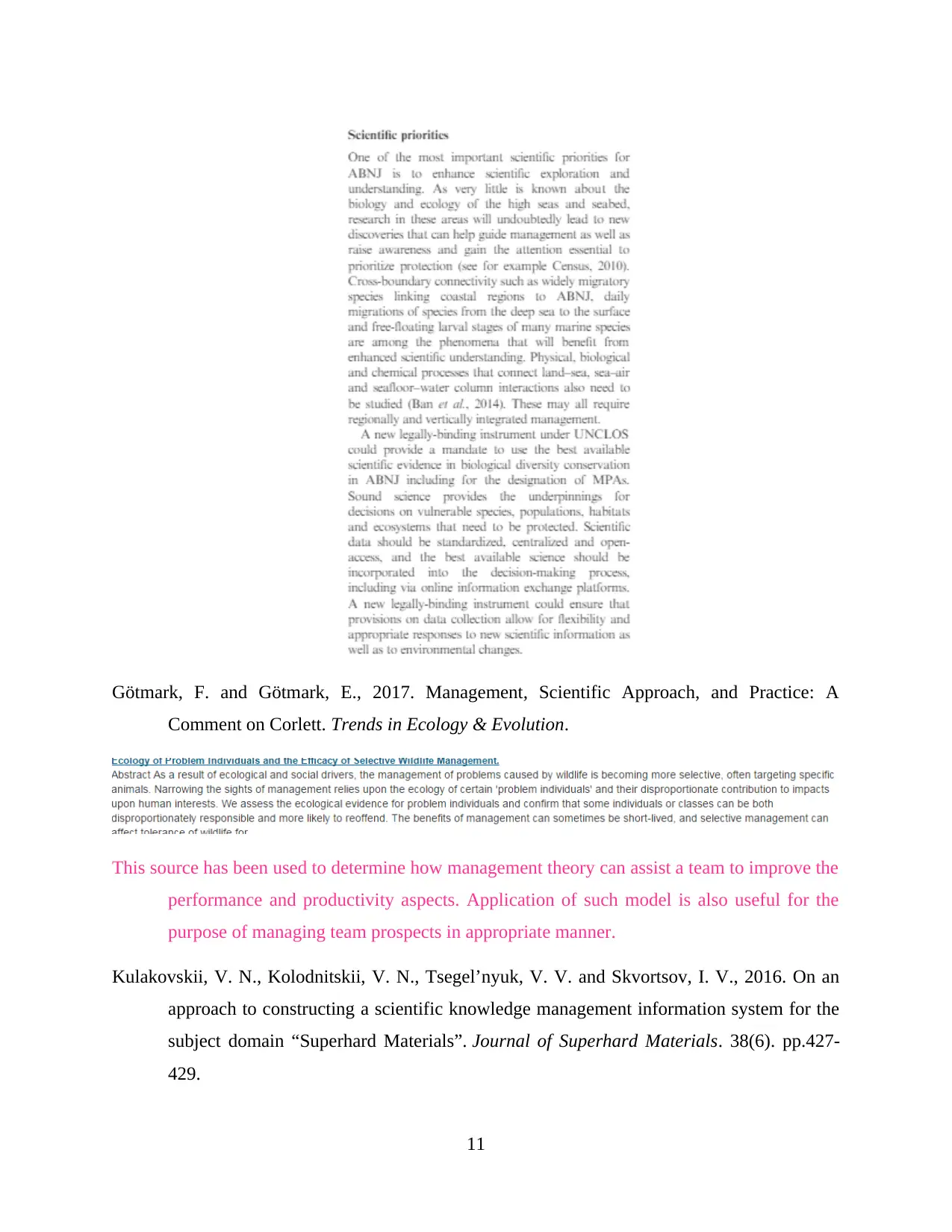
Götmark, F. and Götmark, E., 2017. Management, Scientific Approach, and Practice: A
Comment on Corlett. Trends in Ecology & Evolution.
This source has been used to determine how management theory can assist a team to improve the
performance and productivity aspects. Application of such model is also useful for the
purpose of managing team prospects in appropriate manner.
Kulakovskii, V. N., Kolodnitskii, V. N., Tsegel’nyuk, V. V. and Skvortsov, I. V., 2016. On an
approach to constructing a scientific knowledge management information system for the
subject domain “Superhard Materials”. Journal of Superhard Materials. 38(6). pp.427-
429.
11
Comment on Corlett. Trends in Ecology & Evolution.
This source has been used to determine how management theory can assist a team to improve the
performance and productivity aspects. Application of such model is also useful for the
purpose of managing team prospects in appropriate manner.
Kulakovskii, V. N., Kolodnitskii, V. N., Tsegel’nyuk, V. V. and Skvortsov, I. V., 2016. On an
approach to constructing a scientific knowledge management information system for the
subject domain “Superhard Materials”. Journal of Superhard Materials. 38(6). pp.427-
429.
11
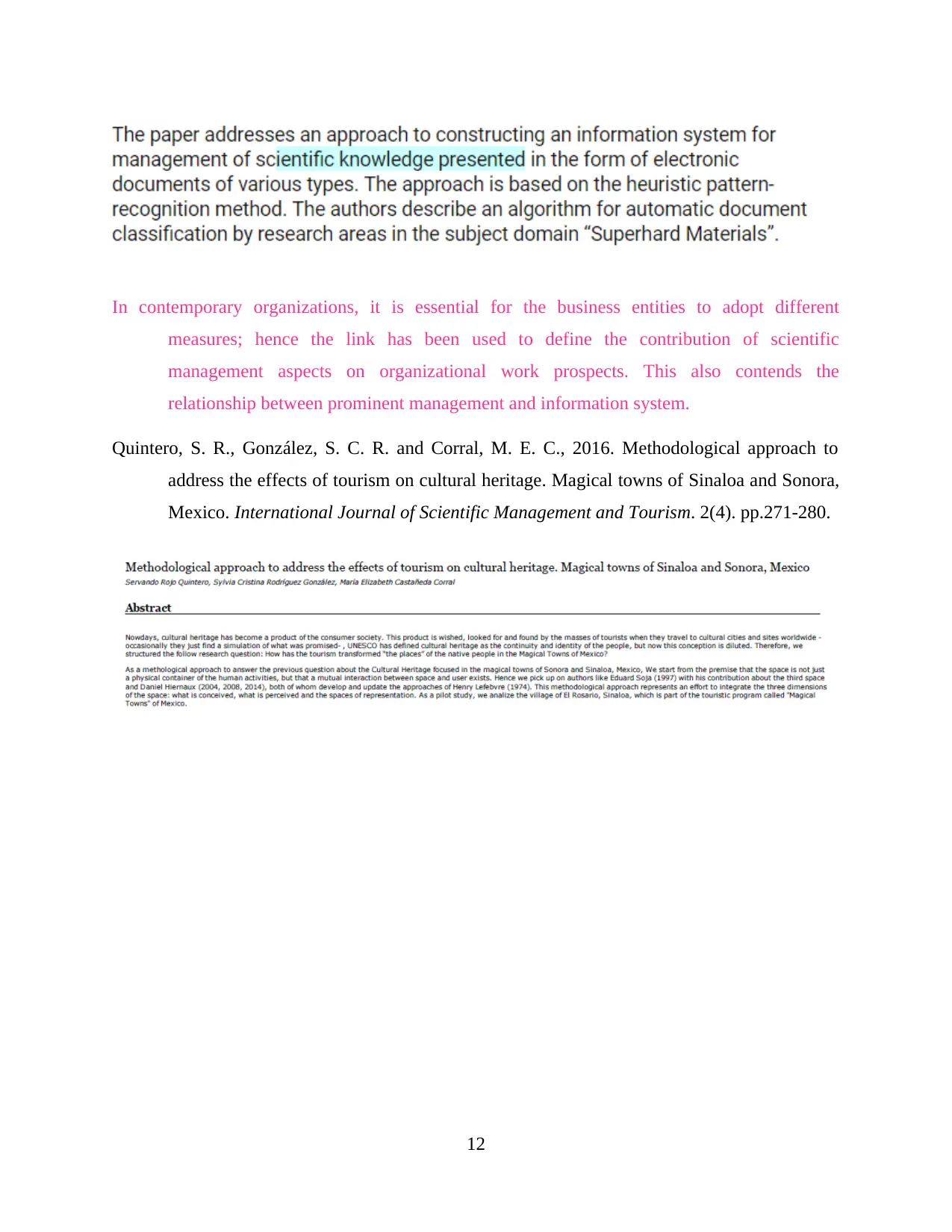
In contemporary organizations, it is essential for the business entities to adopt different
measures; hence the link has been used to define the contribution of scientific
management aspects on organizational work prospects. This also contends the
relationship between prominent management and information system.
Quintero, S. R., González, S. C. R. and Corral, M. E. C., 2016. Methodological approach to
address the effects of tourism on cultural heritage. Magical towns of Sinaloa and Sonora,
Mexico. International Journal of Scientific Management and Tourism. 2(4). pp.271-280.
12
measures; hence the link has been used to define the contribution of scientific
management aspects on organizational work prospects. This also contends the
relationship between prominent management and information system.
Quintero, S. R., González, S. C. R. and Corral, M. E. C., 2016. Methodological approach to
address the effects of tourism on cultural heritage. Magical towns of Sinaloa and Sonora,
Mexico. International Journal of Scientific Management and Tourism. 2(4). pp.271-280.
12
⊘ This is a preview!⊘
Do you want full access?
Subscribe today to unlock all pages.

Trusted by 1+ million students worldwide
1 out of 12
Related Documents
Your All-in-One AI-Powered Toolkit for Academic Success.
+13062052269
info@desklib.com
Available 24*7 on WhatsApp / Email
![[object Object]](/_next/static/media/star-bottom.7253800d.svg)
Unlock your academic potential
Copyright © 2020–2026 A2Z Services. All Rights Reserved. Developed and managed by ZUCOL.





